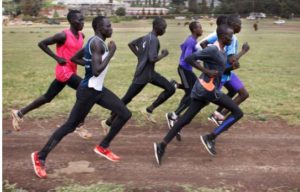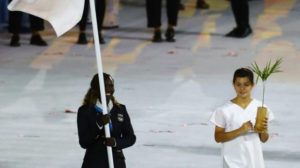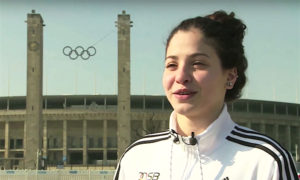Refugees the true heroes of Rio
Amid the furore around drug cheats being allowed to compete, security failures, non-existent plumbing and all pervasive social media nastiness – they are the true inspirations of the Rio Olympics.
They are the 10 members of the first ever refugee team and, to deafening applause, they made history this week by marching into the famed Maracanã Stadium at the Opening Ceremony of the 31st Olympics.
 Rose Nathike Lokonyen, a 23-year-old South Sudanese runner, led the team into the stadium behind the banner of the International Olympic Committee (IOC) to cheers from an ecstatic crowd.
Rose Nathike Lokonyen, a 23-year-old South Sudanese runner, led the team into the stadium behind the banner of the International Olympic Committee (IOC) to cheers from an ecstatic crowd.
The young athletes, originally from South Sudan, Syria, Democratic Republic of the Congo and Ethiopia, have captured the hearts of locals and foreign spectators in Brazil and each has inspirational tales of triumph over adversity.
Lokonyen was eight years old when she fled war and found safety in the remote Kakuma refugee camp in northern Kenya where she has lived there ever since.
“I feel very excited. This is the first chance for the refugees to participate in the Olympics and to give us hope, for us to encourage the young generations of fellow refugees who are remaining in the camps maybe to continue their talent,” she said in a recent interview.
For Lokonyen and her teammates, the prospect of an appearance at the Olympic Games was a very unlikely dream just months ago.

Rose Nathike Lokonyen
“For us it started just few months ago, so we cannot compare our times with those who are high level but we shall try our best… being a refugee doesn’t mean you are not a human,” Lokonyen said.
Another in the refugee team is swimmer Yusra Mardini.
The 18-year-old Syrian was trying to keep things simple, focusing on what she needed to do to in the first heat of the women’s 100m butterfly.
“I was only thinking about water,” she said.
Competing at these 2016 Summer Games is not so straightforward for Mardini, who less than a year ago was fighting for her life in the bitterly cold Aegean Sea.
Mardini and her sister left their war-torn city of Damascus in 2015, travelling through Lebanon before attempting the dangerous sea crossing from Turkey to Greece.
When their boat began to take on water, the sisters and two other people jumped overboard and used a rope to pull the dinghy to safety on the Greek island of Lesbos.
“Your body is almost like … done,” she recalled. “I don’t know if I can describe that.”
She paddled for three and half hours, her body going numb as she helped pull the dinghy to a distant island.

Yusra Mardini
“Without swimming, I would never be alive,” she said.
Now she has made history as part of a small team created specifically for athletes who have fled their homelands.
The International Olympic Committee has provided them with coaches and financial support and allowed them to compete in Rio de Janeiro under the Olympic flag.
There are two Syrian swimmers, two judokas from the Democratic Republic of Congo, five runners from South Sudan and a marathoner from Ethiopia.
President Obama sent the refugee athletes a message of support shortly before they took to the stadium floor ahead of the host nation Brazil.
“Tonight, the first-ever #TeamRefugees will also stand before the world and prove that you can succeed no matter where you’re from,” he tweeted.
At the end of last year, a record 65.3 million people were displaced from their native countries by fear of “persecution, conflict, generalized violence or other circumstances that have seriously disturbed public order,” the United Nations estimated.
Laurie Nowell
AMES Australia Senior Journalist












